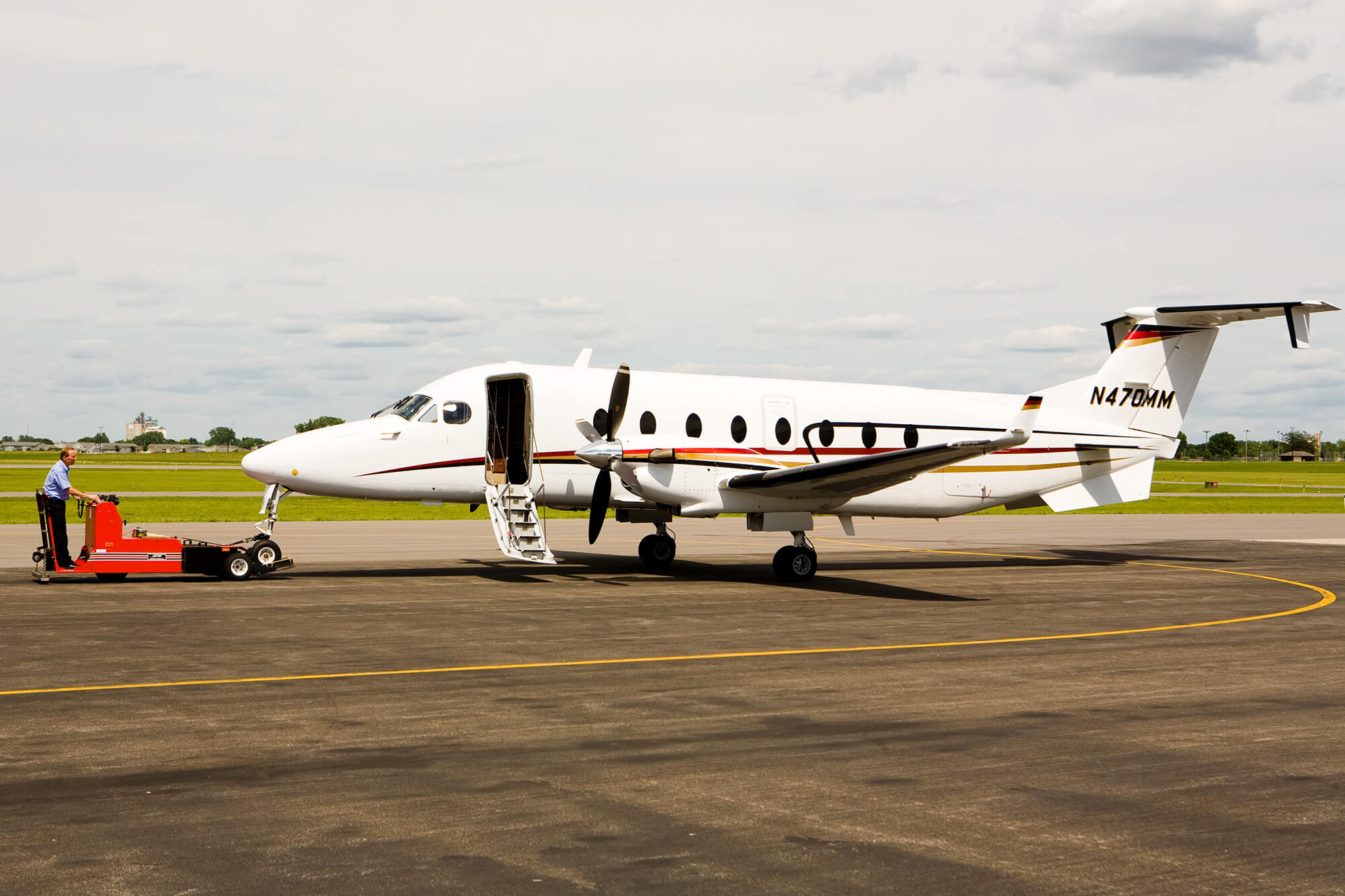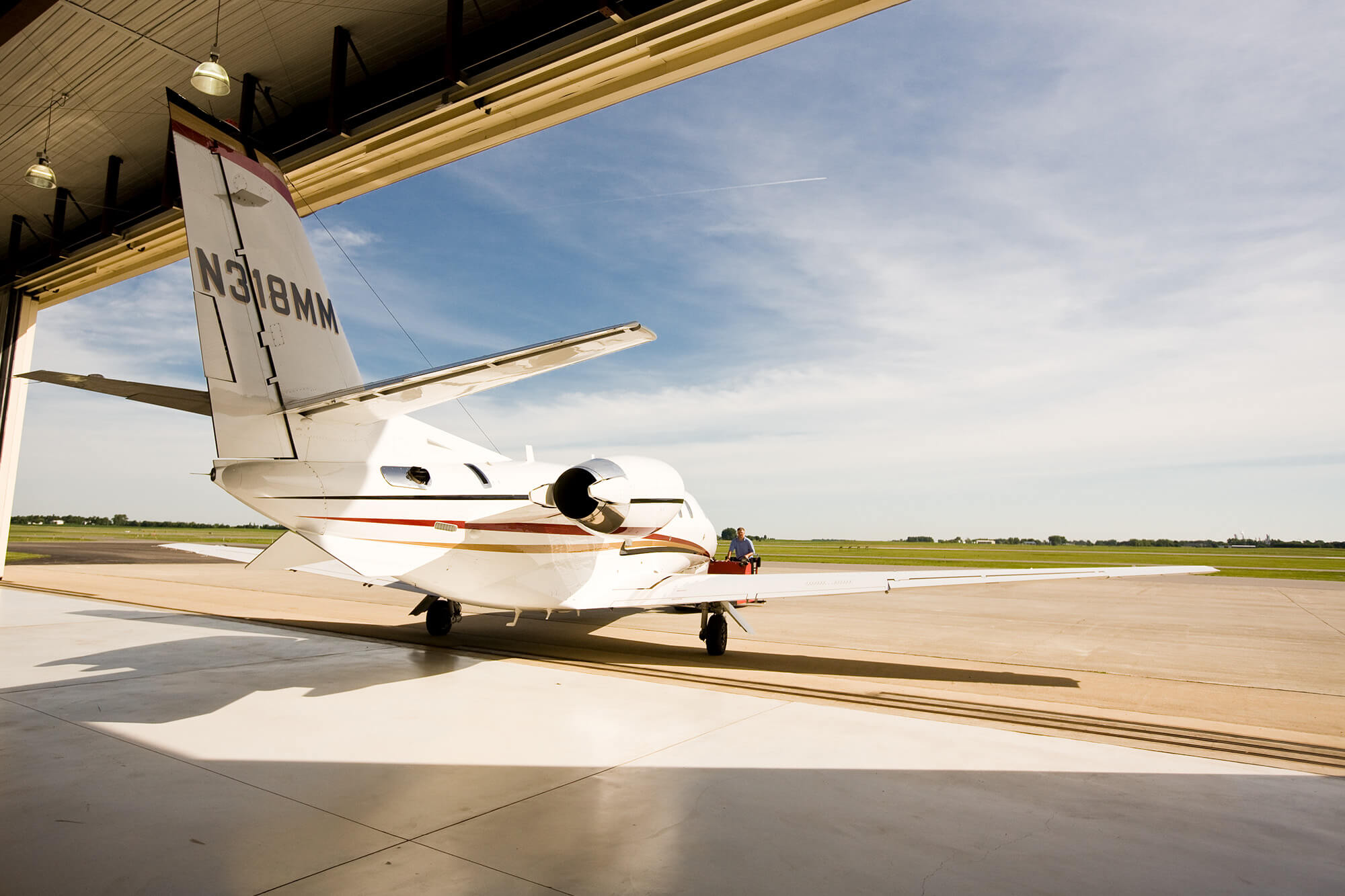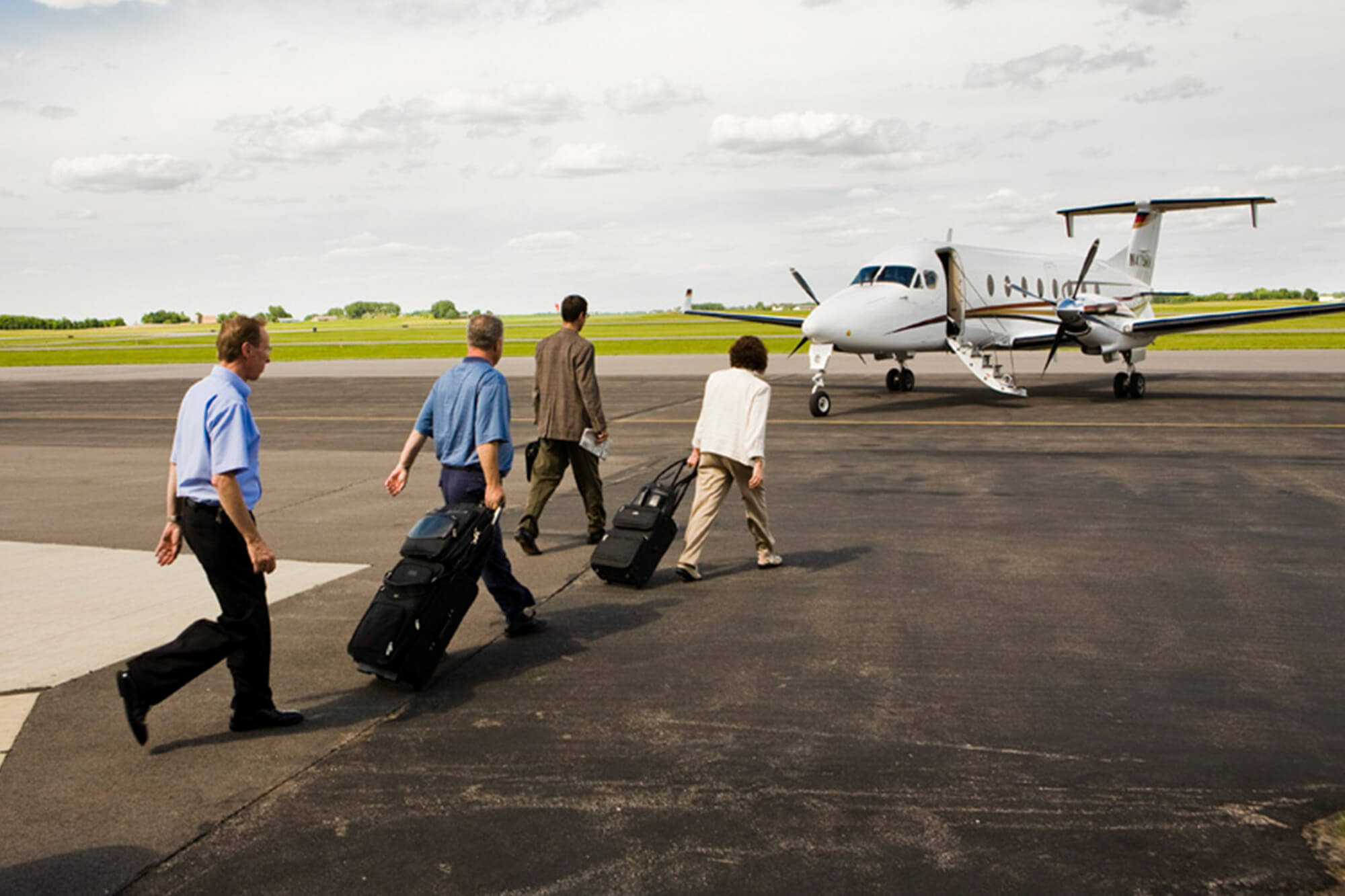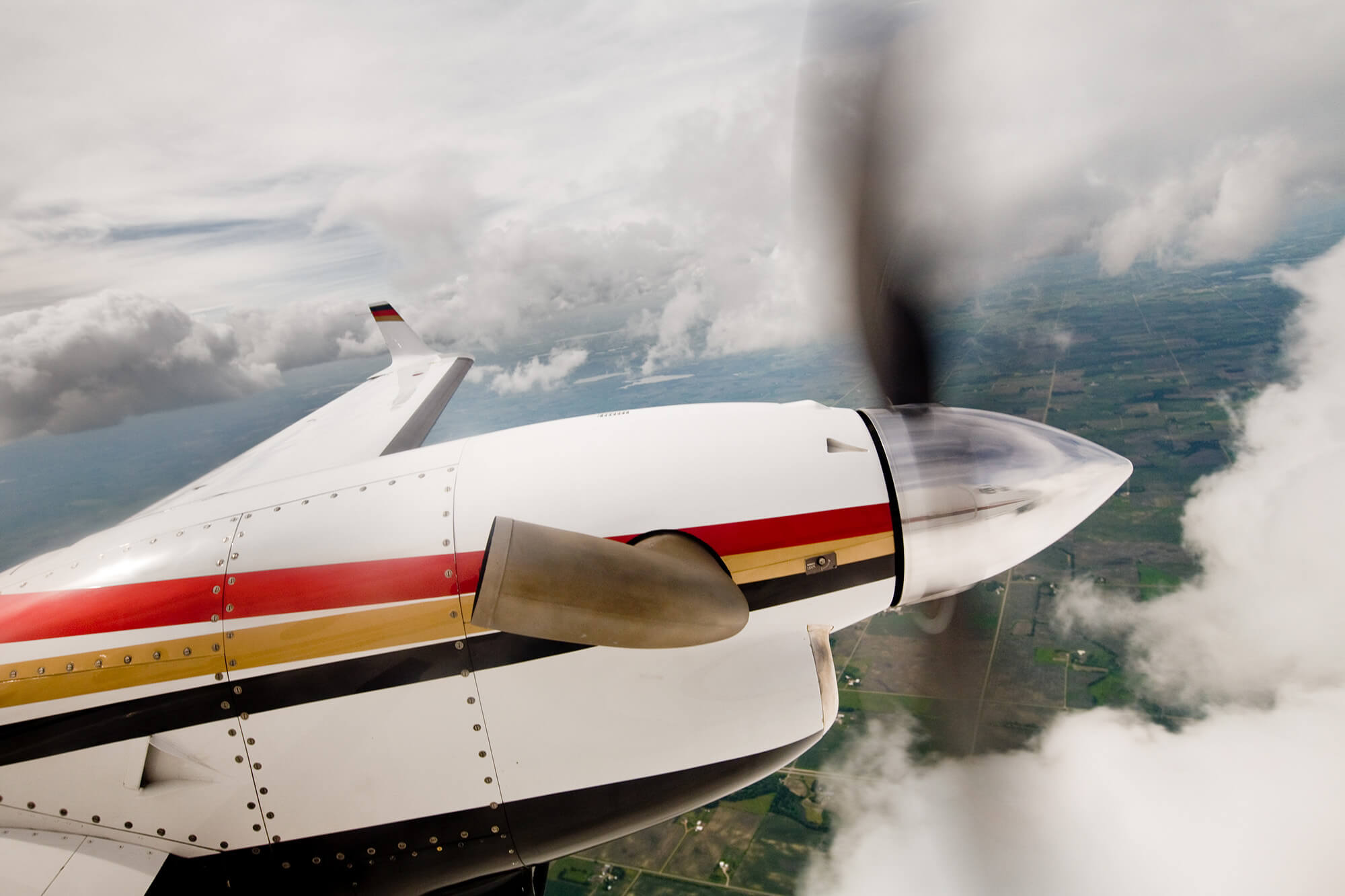
Business Aviation a Key Ingredient in Schwan Food’s Success
August 1, 2008

As the old saying goes, “You can’t get there from here.” For the people who live in the small southwestern Minnesota town of Marshall (pop. 13,000), the challenge of getting from here to there is a fact of life. They must drive three hours and 150 miles, primarily on secondary roads, to Minneapolis-St. Paul International Airport (MSP) to catch an airline flight. It’s not an easy trip during the summer; in winter, it’s sometimes impossible.
However, for those who work for or do business with The Schwan Food Company, Marshall’s largest employer, the connection between the small town and the major airline hub is quick and easy, thanks to the company’s Beech 1900, which makes the 40-minute flight between MSP and Marshall’s Ryan Field (MML) twice daily, five days a week. Approximately 11,000 passengers take the shuttle annually, including consultants, contractors and employees of the company’s four business units.
Mike Booke, senior director of business systems for the Home Service unit of Schwan, is a frequent flier who uses the shuttle to connect with airline flights that take him across the U.S. “If we didn’t have the shuttle, my [airline] connection options would be limited, and I would waste six hours driving back and forth on each trip. Besides, while I am on the shuttle, I can actually work.”
Schwan’s airplane is “a huge help for us,” concurred John D. Cady, an IT expert from Hitachi Consulting. Cady, who typically is in Marshall several days a week, says the airplane is “a big productivity enhancer,” enabling him to arrive at Schwan by 8:30 Monday morning, ready to work.

Indeed, the people at Schwan have long understood how important transportation links are for remote communities. The family-owned company, which was founded in 1952, became famous for the yellow home delivery trucks that first distributed ice cream to rural customers who had just been connected to the electrical power grid. Today, Schwan’s Home Service, Inc. delivers 400 different food products to three million families from nearly 500 distribution centers nationwide using a fleet of 6,000 trucks.
Furthermore, The Schwan Food Company has grown to become a leading provider of frozen foods – Mrs. Smith’s® and Edwards® desserts, Asian Sensations® and Minh® egg rolls, and Freschetta®, Red Baron® and Tony’s® pizza – to retail stores, schools, hospitals, convenience stores, stadiums and restaurants. As a result, the company is the largest manufacturing employer in Marshall, MN; Salina, KS; Florence, KY; and Stillwell, OK.
Aviation a Vital Link
The need to move people to those and other locations keeps Brad Snell, Schwan’s director of aviation, and five other company pilots, busy. Besides operating the Beech 1900, which conducts up to three on-demand missions a day in between shuttle runs, the company flies two eight-passenger Cessna Citation Excels to Schwan plants across the country.
“We’ve been flying for a long time,” noted Alfred Schwan, chairman of the board and oldest of the three brothers who grew the company. “I bought my first airplane in 1966, and the flight department has been in place since 1975. As the company grew, our use of aviation increased because we were doing business all over the country. Many of our executives live here in Marshall, but they need to travel out in the field. Business airplanes help us bring customers here and help us get to our customers. The customers we bring in get to see our factories and R&D facilities, taste our products and see what kind of people they are doing business with, and they are impressed.”
Schwan’s aviation department is impressively efficient as well. Employees who need to travel can book either commercial or company flights via a dedicated web portal. Space on the company planes is allocated on a first-come, first-served basis, and executives can only bump people from their own division.

Safety and Security Are Top Priorities
Although Schwan is a Part 91 operator, maintenance is conducted to Part 135 standards, and training is a high priority. Schwan’s technicians have taken airframe, engine and avionics courses. Besides undergoing annual recurrent training on each aircraft, company pilots have received instruction on high-altitude physiology, weather radar techniques, wind shear avoidance, and CPR and defibrillator use. The department also has an agreement with the Mayo Clinic for its doctors to provide advice in case of an in-flight medical emergency.
Safety, security and continuing improvement are top priorities for Schwan’s aviation department. “The company has given the pilots the ability to cancel, delay or re-route flights as they deem necessary to provide the best safety possible,” said Snell.
The aviation department also has set up internal committees to deal with safety and security, standards, operations manual updates and leadership issues on a quarterly basis, or more often, if needed. Snell calls the operations manual “a living document” that is updated continually and republished annually.
The department also has a designated safety and security officer whom employees can notify if they have any operational concerns. Any issues are forwarded anonymously to the leadership for further consideration. The emphasis on safety also led Schwan’s flight department to work with local controllers to improve approach procedures at MSP.

Association and Industry Involvement
As a former member of NBAA’s Corporate Aviation Management (CAM) Committee, Snell helped support efforts to strengthen the Professional Development Program. “There is a perception among some NBAA Members that the Association is just for the large companies,” Snell said. “But NBAA is also for the little guy. The challenge is that people from smaller departments some-times don’t have time to participate.” Consequently, Snell devoted considerable time informing the CAM Committee’s work to make the program more accessible and valuable to small flight departments and single-pilot operations.
Snell also has worked to make political leaders aware of the value of business aviation and the challenges the industry faces. He personally testified before the Metropolitan Airports Commission against higher landing fees at MSP, and he heeded NBAA’s call to make his voice heard on the national issue of user fees by using the Association’s online Contact Congress resource. “A user fee system would definitely restrict our operations,” he said. “For some smaller operators, it might affect whether they actually operate an airplane or not.”
Fortunately, Snell has solid internal backing for his advocacy efforts. “The company also has a government affairs group, which assists us with aviation issues at the state and federal level,” he said.
Alan Poff, Schwan’s manager of government affairs, observed: “It is important to convey to those on Capitol Hill that companies like ours utilize business aviation because it is absolutely necessary to do business around the globe. It is critical to this community [Marshall] for this company to remain strong by providing jobs. Many rural communities are losing population as people migrate to cities. But not here. This is one place where growth is happening. As a rural company, where aviation is so critical to us, we have to expend some time and resources to effectively address our unique transportation challenges to keep Schwan and our community thriving.”
To many at Schwan, it’s not just about economic growth; it’s about preserving a way of life in small-town America. By all accounts, Marshall is a great place to raise a family, and the company mirrors the work ethic and values of the Midwest. As long as business aviation can continue to provide Schwan with a vital link to customers and markets, it will remain a key ingredient in the company’s recipe for success.


 International Business Aviation Council Ltd.
International Business Aviation Council Ltd.